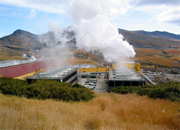Launched at a high-level event at the UN Climate Change Conference in Paris (COP21), the Global Geothermal Alliance, an initiative facilitated by the International Renewable Energy Agency (IRENA) aspires to achieve a 500 per cent increase in global installed capacity for geothermal power generation and a 200 per cent increase in geothermal heating by 2030.
“Geothermal has proven its potential to be part of both the global climate and energy action agenda,” said IRENA Director-General Adnan Z. Amin. “While geothermal can provide baseload power at some of the lowest costs for any power source, it remains under-developed. The Global Geothermal Alliance will provide a platform for partners to share best practices, further reduce costs and get the most benefit out of this sustainable energy resource.”
Nearly 90 countries have potential for geothermal energy resource development; however, just 13 gigawatts of installed capacity exists worldwide.
A proven technology, the main obstacle for geothermal power investment and development has historically been the high upfront costs of surface geophysical studies and drilling to explore for geothermal resources. But once a geothermal project is in operation, it can generate electricity at a low cost. The Alliance will aim to overcome these barriers by mitigating risks, promoting technological cooperation, coordinating regional and national initiatives and facilitating geothermal energy investments into energy markets.
The launch took place in the context of the Energy Action Day at COP21, co-organised by IRENA and featured Alliance member participation from H.E. Olafur Ragnar Grimsson, President, Iceland; H.E. Ségolène Royal, Minister of Ecology, Sustainable Development and Energy, France; H.E. Judy Wakhungu, Cabinet Secretary for Ministry of Environment, Water and Natural Resources, Kenya; and H.E. Simon Bridges Minister of Energy and Resources, New Zealand.
In two years of preliminary consultations, the GGA has gathered substantial support from governments, leading industry players, development partners, regional and national institutions and non-governmental organisations. The initiative was initiated in September 2014 at the Climate Summit organized by UN Secretary-General Ban Ki-moon.
02 Марта 2026 | понедельник | 23:09


